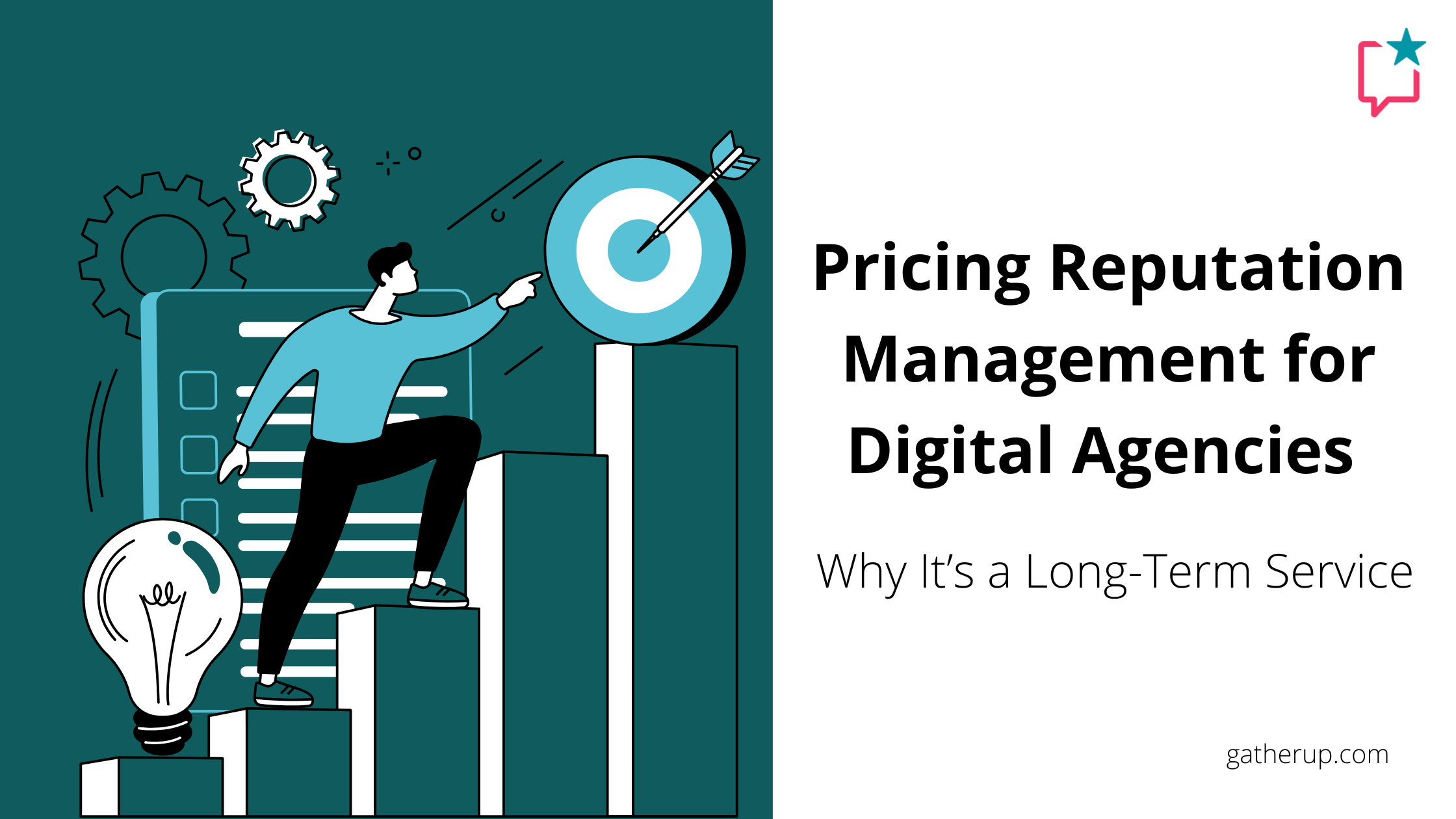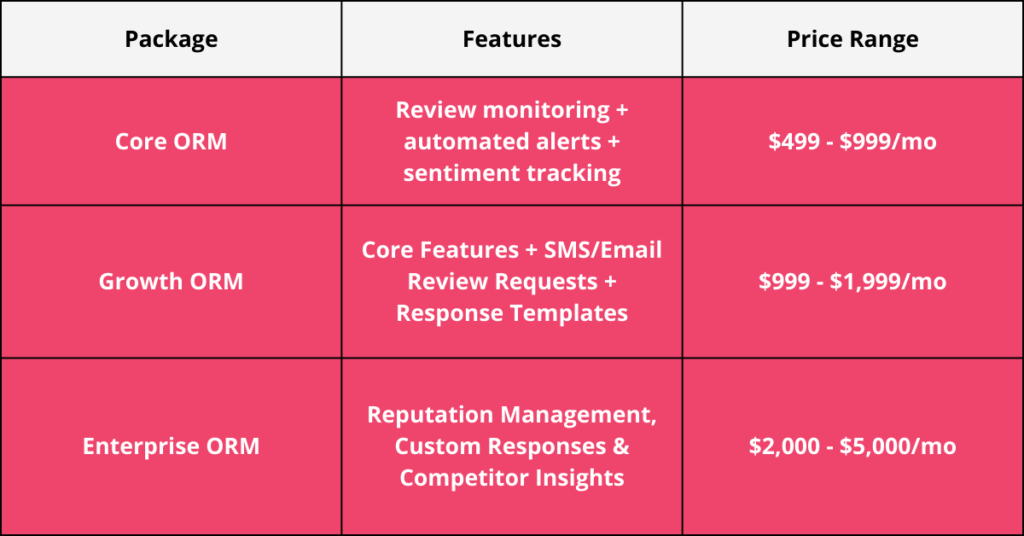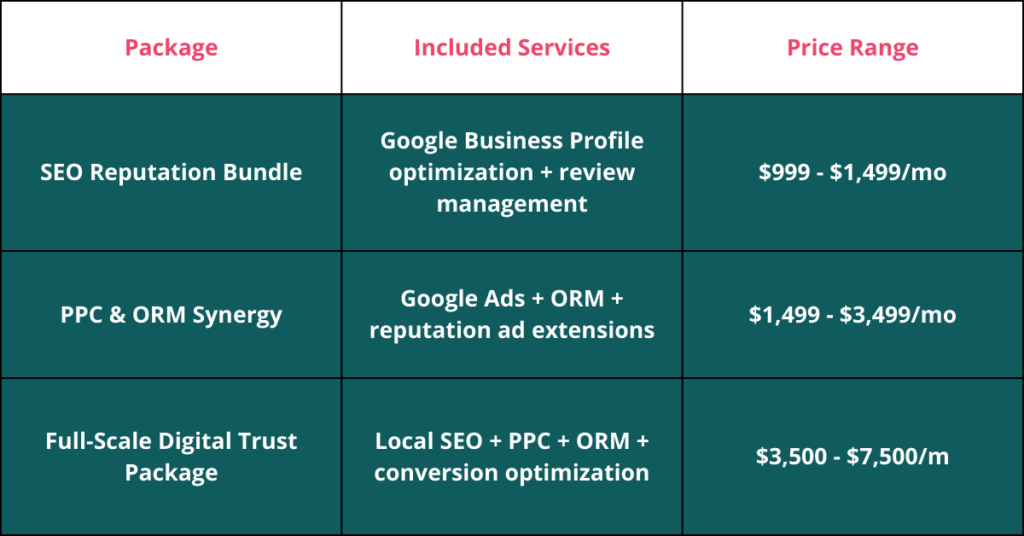
A scenario: Your local business clients want to maintain visibility, build customer trust, and drive revenue.
As a digital agency, you know that online reputation management is the key to achieving these objectives — and so you’ve developed some reputation management services. But up until now, you’ve approached it more like a series of one-off fixes — Band-Aid solutions to apply here and there as needed.
The problem is that your clients can sometimes see a short-term ratings boost with this approach — but no one is getting a lasting impact.
Reputation management for digital agencies can’t be a one-time project or a piecemeal effort. To be effective, it has to be an integral part of digital marketing — which means building it into the core of your agency through strategic packaging and pricing.
We’ll talk about why short-term reputation management fails more often than not and long-term contracts are the way to go. We’ll show how to price reputation management as a digital agency, and also share some quick tips for how to sell long-term reputation management to your clients.
Why Short-Term Reputation Management Costs You More
Short-term fixes, by their nature, are reactive instead of proactive. When your reputation management services don’t reach beyond the present crisis or challenge, you can see a ripple effect of issues:
- Your business client ends up in the same crisis or challenge months later — precipitating the same short-term fix and starting the cycle all over again.
- Without an ongoing strategy, your client’s review volume drops, visibility decreases, and customers lose trust. Consequently, your client begins to doubt their relationship with your agency.
- In the meantime, your agency loses out on long-term, high-margin revenue — and eventually struggles to retain clients.
You can avoid the pitfalls and costs of short-term fixes by approaching reputation management as a long-term commitment — and making sure your pricing reflects this.
Why Your Agency Needs Long-Term Reputation Management Contracts
Before we talk about how to price reputation management as a digital agency, it’s important to really drive home the reasons why a long-term approach to reputation management benefits everyone:
1. Consistency
Long-term reputation management creates consistency. Google prioritizes businesses with regular review activity, giving them a bump in local search rankings. Conversely, stale profiles with old reviews lose ranking. Since reputation management is an ongoing process — not a one-time solution — your clients need to consistently request, respond to, and promote reviews. Pausing any part of that process for any reason can impact the business reputation. What’s more, your clients risk falling back into bad habits — which hurts their SEO and conversions and erodes customer trust.
2. Local SEO
Long-term reputation management gives a boost to local SEO. Google Business Profiles (GBPs) rely on fresh reviews for ranking. When your business clients make it a habit of responding to reviews, using keyword-rich review responses, they help improve their own local search visibility while also increasing engagement and earning greater trust and credibility with their audience. By using good review habits to build a strong online reputation over time, your clients benefit from ongoing local SEO success.

3. PPC Performance
Long-term reputation management improves PPC performance. If your clients have a poor online reputation, they’re likely to have poor PPC conversions. That’s because customers will often see an ad, then cross-check reviews on Google — where the business can’t hide from a less-than-stellar brand image. But ads perform better when clients can display positive reviews and high star ratings. With long-term reputation management focused on building a body of quality reviews, you can directly boost the ROI of paid media for your clients — further justifying an ongoing and systematic approach.
4. Customer Retention
Long-term reputation management improves customer retention. Reviews are a powerful form of social proof for customers, and those who engage with reviews stick around longer. Plus, when a business responds to all reviews — especially negative reviews — they not only can recover lost customers, they also show potential customers that they’re paying attention and take customer feedback seriously. By steadily tending to their business reputation over time, your clients can create brand recognition, trust, and advocacy, and ensure ongoing engagement from loyal customers.
2 Ways to Price Reputation Management for Long-Term Success
Now let’s get to the good stuff: how to price reputation management as a digital agency. The following pricing recommendations are based on long-term commitment — not short-term fixes.
1. The Retainer Model
The monthly retainer model provides consistent, recurring revenue and scalable operations. It also buys you time — since it takes time for clients to see results.
You can set up your contracts with a couple of different lengths: A minimum 6-month contract, which is ideal for showing results, or a 12-month preferred contract, which is ideal for long-term growth and retention. You should avoid offering a month-to-month contract — since it doesn’t give you enough runway to deliver on expectations.
The benefits of retainer-based reputation management services include:
- Predictable cash flow through monthly revenue
- Greater trust and dependency in your agency, since your clients rely on your expertise for ongoing growth
- Stronger client relationships over time and higher client retention
- Better long-term SEO and PPC results for clients
Pricing Tiers for Recurring Services
The pricing formula for a retainer-based model looks like this:
(Total labor cost + software costs + agency margin) ÷ contract length = Monthly Fee
Here are examples for how you can price your recurring online reputation management (ORM) services:

Scaling tip: Tie pricing to review volume and response requirements (higher volumes = higher pricing).
2. Bundled Reputation Management
Bundling reputation management with complementary services like local SEO, PPC, and CRO (conversion rate optimization) allows you to enhance your client’s online reputation while also maximizing the performance and success rates of the other services.
It also reinforces the idea that successful reputation management is a crucial part of an overall digital strategy — not just an “extra” or an add-on.
The benefits of bundled reputation management through multi-service contracts include:
- Reduced churn, since clients are locked into a larger package
- Greater opportunity to upsell into additional agency services
- Better overall performance of campaigns and strategies through a comprehensive approach
Pricing Tiers for Bundled Services
Here are examples of how you can price your bundled online reputation management (ORM) services:

Tips for Selling Long-Term Reputation Management Contracts
Your clients need to know why you’re doing this and why it matters. Here are a few things you can do to effectively sell long-term reputation management to your clients:
- Show the ROI. Highlight before-and-after case studies that demonstrate the value of ongoing reputation management. Show how review volume and responses can drive revenue. Educate your clients that reputation management isn’t optional — it’s a must-have if they want to earn and keep a competitive advantage.
- Require a 6- to 12-month commitment. Explain why reputation enhancement is a long-term process and how month-to-month reputation management tends toward failure — since it’s too easy for businesses to pause or end services and slip back into bad habits.
- Offer a discount. To lock in revenue, consider offering a discount on long-term contracts.
Final Takeaways: Making Online Reputation Management a High-Margin Service
Reputation management isn’t just about monitoring reviews or posting the positive ones to social media — i.e., one-off fixes or actions that don’t achieve long-term results. No matter how you slice it, short-term reputation management is a losing strategy — both for your agency and your clients.
Instead, think about reputation management as a growth driver for your agency. Through long-term contracts, you can deliver ongoing value to your business clients and secure greater profit for your agency.
To win in 2025, you need to know how to price reputation management as a digital agency by making reputation management a recurring, scalable, high-margin service.
If you’re ready to take a fresh, long-term approach with your agency’s reputation management offering, schedule a free consultation with GatherUp today.
